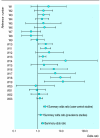Is Helicobacter pylori associated with non-ulcer dyspepsia and will eradication improve symptoms? A meta-analysis
- PMID: 10521198
- PMCID: PMC28257
- DOI: 10.1136/bmj.319.7216.1040
Is Helicobacter pylori associated with non-ulcer dyspepsia and will eradication improve symptoms? A meta-analysis
Abstract
Objectives: To examine the association between Helicobacter pylori infection and non-ulcer dyspepsia, and to assess the effect of eradicating H pylori on dyspeptic symptoms in patients with non-ulcer dyspepsia.
Design: Systematic review and meta-analysis of (a) observational studies examining the association between Helicobacter pylori infection and non-ulcer dyspepsia (association studies), and (b) therapeutic trials examining the association between eradication of H pylori and dyspeptic symptoms in patients with non-ulcer dyspepsia (eradication trials).
Data sources: Randomised controlled trials and observational studies conducted worldwide and published between January 1983 and March 1999.
Main outcome measures: Summary odds ratios and summary symptom scores.
Results: 23 association studies and 5 eradication trials met the inclusion criteria. In the association studies the summary odds ratio for H pylori infection in patients with non-ulcer dyspepsia was 1.6 (95% confidence interval 1.4 to 1.8). In the eradication trials the summary odds ratio for improvement in dyspeptic symptoms in patients with non-ulcer dyspepsia in whom H pylori was eradicated was 1.9 (1.3 to 2.6).
Conclusions: Some evidence shows an association between H pylori infection and dyspeptic symptoms in patients referred to gastroenterologists. An improvement in dyspeptic symptoms occurred among patients with non-ulcer dyspepsia in whom H pylori was eradicated.
Figures
Comment in
-
Will eradication of Helicobacter pylori improve symptoms of non-ulcer dyspepsia? Studies included in meta-analysis had heterogenous, not homogenous, results.BMJ. 2000 Apr 29;320(7243):1208. BMJ. 2000. PMID: 10784558 Free PMC article. No abstract available.
-
Will eradication of Helicobacter pylori improve symptoms of non-ulcer dyspepsia? This meta-analysis is potentially misleading.BMJ. 2000 Apr 29;320(7243):1208-9; author reply 1210. BMJ. 2000. PMID: 10836827 No abstract available.
-
Will eradication of Helicobacter pylori improve symptoms of non-ulcer dyspepsia? Meta-analysis included unreliable studies.BMJ. 2000 Apr 29;320(7243):1209; author reply 1210. BMJ. 2000. PMID: 10836828 No abstract available.
-
Will eradication of Helicobacter pylori improve symptoms of non-ulcer dyspepsia? More studies should have been included in meta-analysis.BMJ. 2000 Apr 29;320(7243):1209-10. BMJ. 2000. PMID: 10836829 No abstract available.
References
-
- Zar S, Mendall MA. Clinical practice—strategies for management of dyspepsia. Br Med Bull. 1998;54:217–228. - PubMed
-
- Talley NJ. Modern management of dyspepsia. Aust Fam Physician. 1996;25:47–52. - PubMed
-
- Chiba N, Hunt RH, Goeree R, O’Brien BJ, Bernard L. A Canadian physician survey of dyspepsia management. Can J Gastroenterol. 1998;12:83–90. - PubMed
-
- Talley NJ. What role does Helicobacter pylori play in dyspepsia and non-ulcer dyspepsia? Arguments for and against H. pylori being associated with dyspeptic symptoms. Gastroenterology. 1997;113(suppl 6):67–77S. - PubMed
-
- Davis S. Triple therapy and Helicobacter pylori. Aust Fam Physician. 1996;25:53–59. - PubMed
Publication types
MeSH terms
LinkOut - more resources
Full Text Sources
Medical
Miscellaneous


